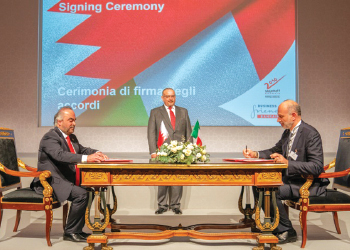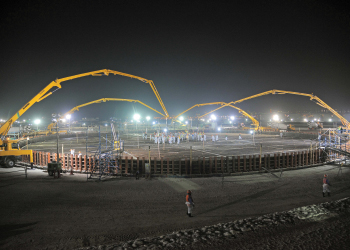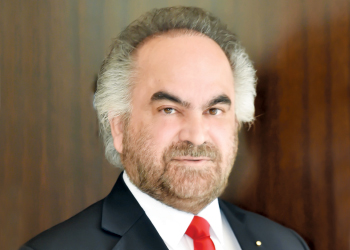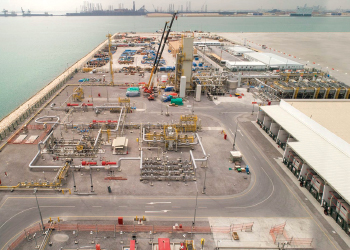
 Bapco's Modernisation Project ... contributing to Bahrain's economic growth
Bapco's Modernisation Project ... contributing to Bahrain's economic growth
The role of oil and gas in Bahrain's economy remains strong. New finds, and new exploration and processing projects are strong signs of the sector's importance to the kingdom's economic growth
Bahrain's energy sector is undergoing a remarkable transformation, with investments in the oil and gas sector having reached $8 billion over the past few years, according to Bahrain’s Oil Minister Shaikh Mohammed bin Khalifa Al Khalifa.
In addition to the discovery of large-scale, unconventional oil and gas reserves that could substantially boost output over the coming decade, Bahrain is also upgrading its oil refinery and hydrocarbons import infrastructure. Also in focus is expanding the use of renewables and energy efficiency initiatives in the utilities sector.
In 2017, new hydrocarbon reserves, estimated to contain probable reserves of 81 billion barrels of oil and 14 trillion scf of associated gas, were discovered in the Khaleej Al Bahrain basin (KAB).
In 2019, the first appraisal wells were drilled, with more expected over the next few years. According to Jim Eastlack, CEO of Tatweer Petroleum, the preliminary results of these test wells at KAB are expected in the next few months.
These results will then be used to update the current understanding of the basin and provide crucial input for the planned initial development plan. Major International Oil Companies (IOCs) are being engaged through datarooms and workshops. The appraisal and promotional campaigns are scheduled to continue through 2020 as Tatweer Petroleum plans to drill a number of additional test appraisal wells to meet the projected start of the initial development plan in 2022.
"The number of future appraisal wells to be drilled will depend on the resulting data from studies conducted on the currently drilled wells," says Eastlack.
 |
Shaikh Mohammed ... achieving major milestones |
It might still be a few years until production from KAB actually starts, but Shaikh Mohammed says they are on schedule with forming the initial development plan, anticipated five years from the date of the announcement of the discovery.
Separately, on the Bahrain Field, Tatweer has initiated a number of geological and engineering studies following the announcement of the discovery of the pre-Unayzah gas reservoirs in 2018, in order to set up a notional development plan for two reservoirs.
Tatweer Petroleum is planning to drill the first pre-Unayzah appraisal well to achieve an initial production in 2020. Deployment of the rig and preparations are underway, and drilling operations have been projected to start soon, says Eastlack.
Additionally, Tatweer was working on other exploration projects, notably including a regional 2D seismic survey of all of Bahrain’s onshore and offshore territory.
The survey was expected to have finished in the first quarter of 2019. The data will be used to identify areas for further high-resolution, 3D seismic surveys. In 2018 the authorities also signed joint study agreements with international oil companies, including Eni, to assess the potential of some of its offshore blocs.
 |
Nassif ... Bapco modernisation target |
Regarding the mapping project of Tatweer’s underground gas distribution network, Eastlack says that is currently in the evaluation phase. "Pilot studies have been conducted and the results are currently being assessed. Once the assessments are completed, a winning bidder will be selected to begin the execution of the project, which is scheduled to start next year."
In other projects, Italian energy major Eni is gearing up to start drilling for the first oil exploratory well in the northern maritime block (No 1) by early next year.
Eni has already conducted a study of the area, where water depths range from 10 to 70 m, and signed an MoU with the National Oil and Gas Authority (Noga) in January 2019.
Shaikh Mohammed says other blocks are currently in the evaluation and survey phase, after National Oil and Gas Authority (Noga) signed an exploration and production sharing agreement with the Italian company in June.
BAPCO MODERNISATION
On the downstream side, a multi-billion-dollar investment underway into Bapco’s Modernisation Programme (BMP) will transform the company into one of the most competitive and environmentally-compliant refineries. This is the largest and most significant investment in the refinery’s history
 |
Eastlack ... turning around Bahrain's energy fortunes |
"When completed in 2022, the company will effectively double its earnings potential through a 43 per cent increase in its capacity, its product slate will better match global market demand, and new world-class assets at the refinery will help deliver more energy efficiency and output," says Dr Dawood Nassif, Chairman of Bapco.
On the progress of BMP, he says Bapco is approaching the end of the detailed design activities that have taken place across three operating centres in Rome, Madrid and Seoul, providing the foundation for the implementation of BMP through the specification of all equipment and bulk materials required, and provision of all purchase orders and approval of construction drawings.
By August 2019-end, 60 per cent model reviews of all major process units were completed, says Nassif.
Meanwhile onsite, in Bahrain, work is in progress. Nassif says wherever possible, contracts were awarded preferentially to local companies that have the necessary credentials to deliver world-class performance on mega projects such as BMP.
Bahrain’s refinery margins have generally been under pressure due to new refining capacity outpacing demand growth since 2018, especially in East of Suez markets, says Nassif.
"Rising feedstock costs coupled with increasing concerns about an apparent softening of the global economy and accompanying demand reductions have exerted further downward pressure on refining margins this year," he adds.
As of September 2019, the year to date crude run was ahead of budget, comparing favourably with previous years. Operating costs are also under control, supporting earnings that are consistent with the company’s budget expectations. A portion of the feedstock for the Sitra refinery comes from Saudi Arabia.
With the aim of securing adequate supply for the Sitra expansion ahead of its completion in 2022, in November 2018 Bahrain and Saudi Arabia launched a new 118-km oil pipeline – including a 41-km offshore section – between the Sitra refinery and Aramco’s Abqaiq oil field.
Built at a cost of $330 million, the AB-4 pipeline will have a 350,000-bpd capacity, double that of the existing line which, given that it is mostly located above ground and travels through increasingly built-up areas, will eventually be decommissioned.
Nassif says as 2020 progresses, the consensus amongst leading industry analysts is that the trend of strengthening middle distillate cracks will continue. This is in response to a tightening of the global gasoil market caused by the January 1, 2020 implementation of the International Maritime Organisation (IMO) sulphur cap regulation for bunker fuels. "Since Bapco is a middle distillate-oriented refinery, this projection bodes well for our business during the coming months," he remarks.
RISE IN INVESTMENT
Bahrain has been seeking both partners and financial backers for the development of its major new oil and gas find, as well as to involve oilfield service firms more directly in the sector’s development. This could see foreign investment accelerate over the coming years.
If this happens, this will be a turnaround for the energy sector, which saw a reduction in inflows post-2014 due to the low-oil price environment, a situation that was exacerbated by the withdrawal of two key players in early 2016 – US oil firm Occidental Petroleum and Abu Dhabi’s sovereign investment vehicle Mubadala Investment Company – from their equity participations in Tatweer. Following the move, output at the Bahrain Field fell significantly in 2016 and 2017.
Other foreign investors in the sector include Kuwait’s Boubyan Petrochemical Company and Chevron, which each hold a 12.5 per cent stake in Banagas; and Kuwait and Saudi firms having stakes in the petrochemicals company, Gulf Petrochemical Industries Company (GPIC).
RENEWABLES TARGET
Under targets set by the National Renewable Energy Action Plan, approved in early 2017, the government aims for renewables to account for 5 per cent of the kingdom’s total electricity capacity by 2025 – equivalent to about 250 MW – rising to 10 per cent a decade after that.
Around 50 MW of the 2025 total is expected to come from power generated by wind, 20 MW from waste-to-energy and the rest from solar. To help develop capacity and promote energy efficiency, the authorities partnered with the UN Development Programme to establish a new policy-making body called the Sustainable Energy Unit (SEU) in 2014.
Dr Abdul Hussain Mirza, President of the Sustainable Energy Authority (SEA), says the combined total of actual and planned renewable energy systems in the kingdom was about 131 MW. This means that 50 per cent of the 2025 target has already been achieved, leaving seven more years for the other 50 per cent.
The EWA, for its part, is in the process of building a pilot mixed renewables plant in Al Dur, located in the southern region. The BD6.5 million ($17.2 billion) facility will have a solar capacity of 3 MW and a wind capacity of 2 MW and is expected to come on-line in 2019.
Larger-scale infrastructure is also in the pipeline. In March 2018 a public request-for-concept tender was issued for a 100-MW solar plant to be built as an independent power project (IPP) on a 2 million sq m landfill site in Askar, on the south-east coast. A total of 13 companies were selected out of 26 bidders.
GREEN FRONT
Bahrain’s energy sector is keen on meeting international regulations on environmental footprints, and leading here is Bapco.
The national oil company has a long legacy of recognising the importance of sustainable development and corporate social responsibility. Since 2000, more than $320 million have been invested in the best available technology to ensure compliance with local regulations and international standards for land, air and water.
Also, the BMP is designed to meet and exceed local and international regulations on environmental footprints. In addition to improving the refinery’s Energy Efficient Index by almost a third, the BMP will improve air quality by reducing sulphur dioxide and Nitrous Oxide emissions by 50 per cent and 5 per cent respectively even though refinery throughput increases by some 43 per cent.
There will also be a 9 per cent reduction of volumes of treated wastewater discharged to the sea. The project will rehabilitate the soil and improve its quality, support biodiversity through further plantation of mangroves (a programme started in 2018) and ensure limited noise impact during both construction and operation phases.
A continuous ‘Waste Segregation and Recycling Programme’ was launched at company operations in February 2017, aimed at reducing the amount of office waste going to landfill on a daily basis.
Bapco’s projects in 2020 focus on completing multi-year transformative initiatives and critical engineering and environmental projects that will enable the company to take full advantage of the BMP investment. Bapco is currently working with the Arabian Gulf University (AGU) to conduct joint research into bioremediation of oily waste sludge.









































































